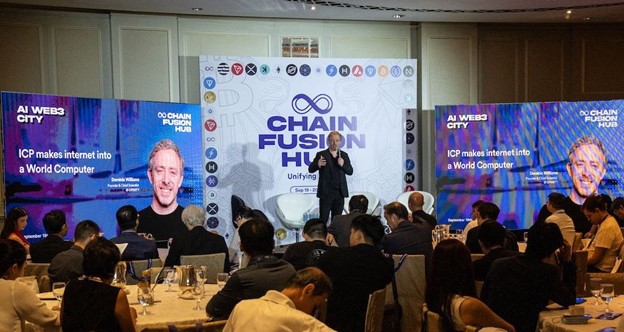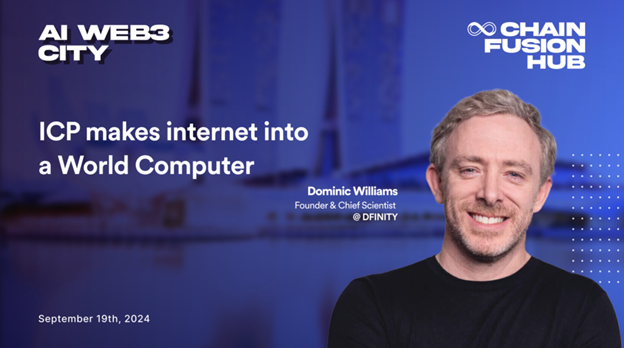Key Takeaways:
- The Internet Computer (ICP) provides a comprehensive technical stack that enables direct, on-chain data storage, removing the dependency on centralized web2 infrastructure.
- ICP stands out with its exceptional processing capability – handling 1.5 million Ethereum-equivalent transactions per second.
- Systems built on the ICP network are immune to cyberattacks, offering a significant advantage in today’s increasingly interconnected world.
- Also renowned for its reliability, ICP “never crashes” and maintains continuous operation.
- Cambodia is actively exploring the use of ICP to establish itself as a leader in technology and innovation within APAC.
The Chain Fusion Hub @ Token2049 Singapore conference took place over two days, just ahead of the city’s signature F1 Night Race. DFINITY Founder and Chief Scientist Dominic Williams delivered an impactful keynote “ICP Makes the Internet into a World Computer“. Williams gave an overview of ICP’s groundbreaking blockchain technology that surpasses the limitations of traditional blockchains and represents a paradigm shift in how applications are built and secured.
ICP Far More Advanced Compared to Traditional Blockchains
Williams began by emphasizing that while ICP is a blockchain, it possesses fundamentally different properties. Unlike traditional blockchains that rely on web2 infrastructure for data storage and security, ICP allows for direct data storage on the network, eliminating the need for centralized servers and cloud services. This, he argued, provides significant advantages in terms of security, scalability, and reliability.
“Traditional blockchains are built on web2,” Williams explained. “They rely on web servers, anti-intrusion systems, or the cloud. All data resides on web2, and we trust cybersecurity systems to keep it safe. ICP is different. You can store vast amounts of data directly on the network, without using traditional technology.”
He highlighted the impressive processing power of the Internet Computer blockchain, stating that it can handle approximately 1.5 million Ethereum-equivalent transactions per second. “In one hour,” Williams asserted, “the Internet Computer processes more smart contract compute than all of the hundreds of blockchains process in a year.”
This exceptional scalability, speed, and efficiency makes ICP a viable and superior technical stack for building a wide range of applications.

No More Need For Cybersecurity For Data Protection
Williams then shifted his focus to the critical importance of cybersecurity in the age of smart cities and AI. He proclaimed that building systems entirely on the ICP network renders them immune to cyberattacks.
“ICP is cybersecurity free,” Williams declared. “Hackers are getting smarter, and sooner or later, GPT will be adapted and fall into the hands of these hackers, leading to a huge escalation in the cybersecurity crisis. It’s very clear that the solution is to provide platforms where you don’t need cybersecurity.”
He dismissed the traditional approach of relying on firewalls, anti-intrusion systems, and security teams as a flawed strategy. “The idea that we can build important platforms to run a smart city and then desperately try to protect these systems with firewalls, anti-intrusion, malware, security teams, security configurations, is a program that cannot work,” Williams stated. “It is absolutely essential that humanity moves to a new kind of IT platform that is immune to cyberattacks.”
A Network That Never Crashes, and Custom AI Data Infrastructure
In addition to security, Williams emphasized the reliability of the ICP network, stating that it never crashes and can maintain continuous operation. He cited the example of the New York subway system, which experienced disruptions due to system failures, to illustrate the importance of reliable infrastructure.
Williams also addressed the growing significance of AI and its implications for data security. He noted that while large-based models like GPT offer tremendous potential, they also pose a security risk as sensitive data is uploaded to centralized servers.
“AI is going to be extremely important,” Williams acknowledged. “Facial recognition, large language models, custom AI – the problem is that big-based models like GPT require uploading all sensitive data to an American corporation. AI is going to become a hot wallet for data. They can’t trust GPT with sensitive data; it’s a big security problem.”
He then introduced Toko, a language developed on ICP, which enables the creation of AI-powered applications that can manage inventory, CRM, and other tasks without the need for developers. “People can talk to AI, put data into a web application, and the AI will just say ‘done’,” Williams explained. “It can create and update information systems without a developer. Talk to AI and get the information they need.”
Cambodia To Leverage ICP Tech Stack To Establish Smart City Status
Williams concluded his keynote with a significant announcement, revealing that Dr. TRY Sophal, Cambodia’s Deputy Director-General of General Department of Science, Technology & Innovation of Ministry of Industry, Science, Technology & Innovation (MISTI), has signed a letter of intent with DFINITY to explore how Cambodia can leverage the ICP tech stack and other emerging technologies to position itself as a powerhouse in technology and innovation in the APAC region.
This announcement underscored the growing recognition of ICP’s potential to transform not only individual applications but also entire economies. Williams’ vision of a world computer, powered by ICP, has the potential to reshape the digital landscape and usher in a new era of secure, reliable, and decentralized applications.



